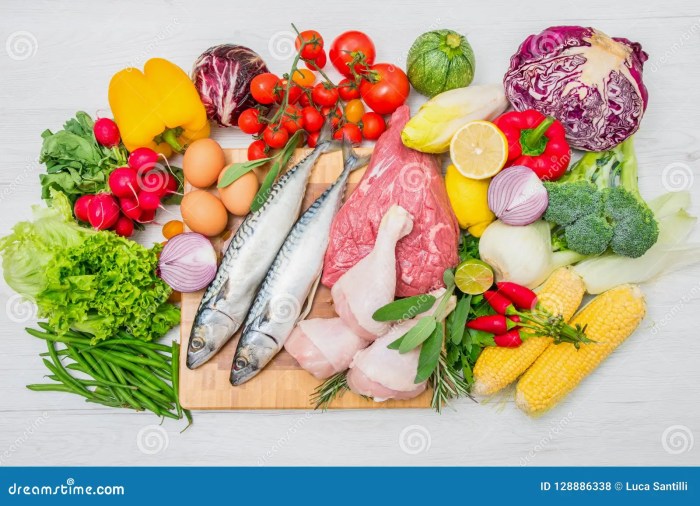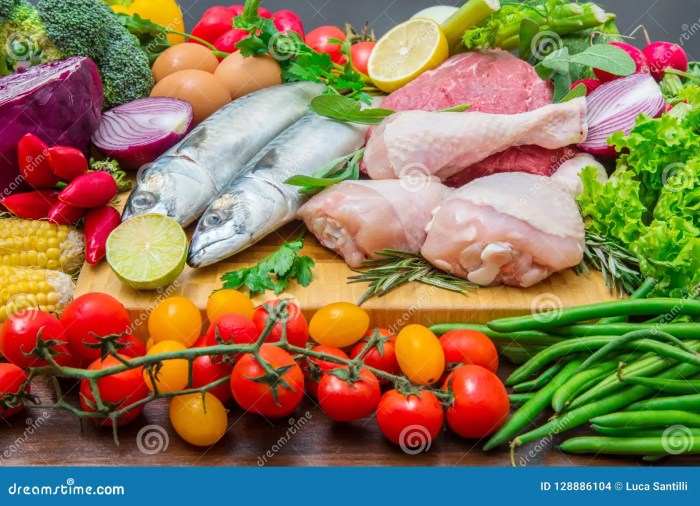Embark on a culinary journey with the fish and vegetable diet, where the bounty of the sea and the earth converge to nourish your body and tantalize your taste buds. Dive into the nutritional depths of this wholesome approach to eating, unlocking the secrets to vibrant health and longevity.
From the omega-rich wonders of salmon to the antioxidant-packed goodness of leafy greens, discover the myriad benefits that await you. This diet not only satiates your hunger but also empowers you to reduce the risk of chronic diseases, boost your energy levels, and maintain a healthy weight.
Health Benefits of a Fish and Vegetable Diet

A diet rich in fish and vegetables offers a multitude of health benefits. Both fish and vegetables are packed with essential nutrients, including vitamins, minerals, and antioxidants, that contribute to overall well-being.
Nutritional Value of Fish and Vegetables
- Fish:Rich in protein, omega-3 fatty acids, vitamin D, and selenium.
- Vegetables:Excellent sources of fiber, vitamins A, C, and K, potassium, and folate.
Health Benefits of Consuming a Fish and Vegetable Diet
- Reduced Risk of Heart Disease:Omega-3 fatty acids in fish have anti-inflammatory properties that help reduce blood pressure and improve cholesterol levels, lowering the risk of heart disease.
- Stroke Prevention:Fish consumption has been linked to a lower risk of stroke due to its anti-inflammatory effects and its ability to improve blood flow to the brain.
- Protection Against Certain Cancers:Antioxidants in fish and vegetables, such as vitamin C and beta-carotene, may help protect against certain types of cancer, including prostate, lung, and colon cancer.
Challenges of Maintaining a Fish and Vegetable Diet
Adhering to a fish and vegetable diet can present certain obstacles. Common barriers include:
- Cost:Fish and vegetables can be more expensive than other food items.
- Availability:Fresh fish and vegetables may not always be readily available, especially in certain regions or during specific seasons.
- Lack of Culinary Skills:Preparing fish and vegetables in a flavorful and appealing way requires some culinary skills.
Overcoming the Challenges
To overcome these challenges, consider the following tips:
- Finding Affordable Fish and Vegetables:Explore local markets, discount stores, and online retailers for deals and discounts. Frozen and canned fish can also be more budget-friendly options.
- Meal Planning:Plan your meals ahead of time to ensure you have the necessary ingredients on hand. This will help you avoid impulse purchases and stick to your diet.
- Learning Basic Cooking Techniques:Take cooking classes, watch online tutorials, or ask friends and family for guidance on preparing fish and vegetables. With practice, you can master simple techniques that make your meals delicious and nutritious.
Sample Meal Plan for a Fish and Vegetable Diet
This sample meal plan provides a balanced and nutritious approach to a fish and vegetable diet, ensuring adequate intake of essential nutrients while promoting overall well-being.
Day 1
- Breakfast: Oatmeal with berries and nuts
- Lunch: Grilled salmon with roasted broccoli and quinoa
- Dinner: Vegetable stir-fry with tofu and brown rice
Day 2
- Breakfast: Scrambled eggs with spinach and whole-wheat toast
- Lunch: Tuna salad sandwich on whole-wheat bread with lettuce and tomato
- Dinner: Baked tilapia with steamed asparagus and sweet potato
Day 3
- Breakfast: Greek yogurt with fruit and granola
- Lunch: Leftover vegetable stir-fry from Day 1
- Dinner: Salmon burgers with roasted carrots and parsnips
Day 4
- Breakfast: Smoothie made with fruits, vegetables, and protein powder
- Lunch: Grilled chicken salad with mixed greens, vegetables, and avocado
- Dinner: Vegetable soup with whole-wheat bread
Day 5
- Breakfast: Whole-wheat pancakes with fruit syrup
- Lunch: Leftover salmon burgers from Day 3
- Dinner: Shrimp tacos with grilled vegetables and whole-wheat tortillas
Day 6, Fish and vegetable diet
- Breakfast: Hard-boiled eggs with whole-wheat toast and avocado
- Lunch: Tuna melt sandwich on whole-wheat bread with tomato soup
- Dinner: Baked cod with roasted vegetables and quinoa
Day 7
- Breakfast: Overnight oats with fruit and nuts
- Lunch: Leftover baked cod from Day 6
- Dinner: Grilled salmon with roasted asparagus and sweet potato
Sustainability of a Fish and Vegetable Diet

Consuming fish and vegetables can have varying environmental impacts, depending on the sourcing and production practices.
Fishery practices can significantly affect marine ecosystems. Overfishing, habitat destruction, and bycatch contribute to the decline of fish populations and damage to marine environments. Choosing sustainable seafood options, such as those certified by the Marine Stewardship Council (MSC) or the Aquaculture Stewardship Council (ASC), helps support responsible fishing practices that minimize environmental impact.
The age-old debate between vegan and vegetarian diets continues to spark discussion. While both promote plant-based nutrition, the distinction lies in the exclusion of animal products. Vegans abstain from all animal-derived foods, including meat, dairy, and eggs, while vegetarians primarily avoid meat and fish.
Understanding the differences between these diets is crucial for making informed dietary choices. Learn more about the nuances of vegan vs vegetarian diets and discover which aligns best with your health and ethical preferences.
Sustainable Seafood Practices
- Avoid overfished species:Choose fish that are abundant and well-managed, such as salmon, tuna, and mackerel.
- Opt for locally sourced fish:This reduces transportation emissions and supports local fisheries.
- Consider farmed fish:Aquaculture can provide a sustainable alternative to wild-caught fish, but choose farms that follow responsible practices, such as using low-impact feed and minimizing pollution.
Plant-Based Diets and Environmental Footprint
Plant-based diets have a lower environmental footprint compared to diets that include animal products. Producing plant-based foods generally requires less land, water, and energy, and generates fewer greenhouse gas emissions.
If you’re considering adopting a plant-based diet, you may be wondering about the vegan vs vegetarian diet. While both diets exclude meat, fish, and poultry, there are key differences between them. Vegans also abstain from consuming any animal products, including eggs, dairy, and honey, while vegetarians do not.
By incorporating more plant-based meals into their diet, individuals can contribute to reducing the environmental impact of food production.
Final Review: Fish And Vegetable Diet

Incorporating a fish and vegetable diet into your lifestyle is an investment in your well-being. Embrace the flavors, textures, and nutritional abundance that this dietary approach offers. Whether you’re a seasoned foodie or a novice cook, the journey towards optimal health begins with every bite of this wholesome and delicious cuisine.
Question Bank
What are the key nutritional benefits of a fish and vegetable diet?
A fish and vegetable diet is a rich source of essential nutrients, including omega-3 fatty acids, vitamins A, C, and E, and minerals like iron and calcium. These nutrients work synergistically to support heart health, reduce inflammation, boost immunity, and promote overall well-being.
How can I overcome the challenges of maintaining a fish and vegetable diet?
Overcoming the challenges of a fish and vegetable diet requires a proactive approach. Explore affordable and accessible sources of fish and vegetables, plan your meals in advance, and equip yourself with basic cooking skills. Consider joining a community or online forum for support and inspiration.
Is a fish and vegetable diet sustainable?
Sustainability is a crucial aspect of a fish and vegetable diet. Choose sustainable seafood options, such as those certified by the Marine Stewardship Council (MSC). Additionally, incorporate plant-based meals into your diet to reduce your environmental footprint.